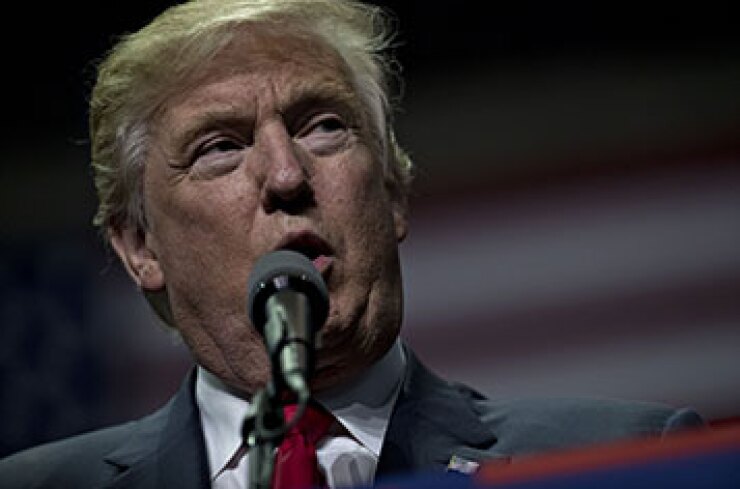
WASHINGTON – President Trump's executive order to scale back the Dodd-Frank Act could initiate what dealers see as a "critical reassessment" of the slew of muni rules implementing the act, although any substantive changes to the act would have to be left to Congress, market participants said.
The executive order, signed Friday, directs the Treasury secretary to meet with major financial regulators and deliver a report within 120 days detailing what provisions are working and not working with Dodd-Frank. The report would also make recommendations about legal and regulatory changes that should be made to the law. Observers see the order, which cannot overturn portions of the statute, as the start to Trump's stated goal of dismantling the law, which was enacted in July 2010 as a response to the financial crisis.
While the Securities and Exchange Commission is an independent agency and farther removed from executive orders than executive branch agencies, the order could still spur the SEC to re-evaluate its muni market rules implementing Dodd-Frank, sources said. However, they added, it remains to be seen whether those regulations will warrant a review.
Dodd-Frank was responsible for numerous regulatory developments in the muni market, including imposing a fiduciary duty on municipal advisors (MAs) and creating a federal regulatory framework for MAs. The act required MAs to register with both the SEC and Municipal Securities Rulemaking Board. Dodd-Frank's fiduciary duty requirement and MSRB authority are not affected by Friday's order, but the SEC has the ability to review how it undertook the directives and implemented them, participants said. Those reviews could focus on decisions that were made while carrying out the act's directives, such as creating the Independent Registered Municipal Advisor exemption for dealers. The IRMA exemption allows dealers to give advice to issuers without having to register as an MA if the issuer has proof that it has an IRMA.
John Vahey, managing director of federal policy for Bond Dealers of America, said BDA members "believe a critical reassessment of the regulations associated with Dodd-Frank and the fiduciary duty rule is a welcome first step" but added that attention to other rules outside the scope of Dodd-Frank are also necessary.
"For smaller broker-dealers, it is absolutely necessary to assess the negative impact on competition that has been caused by the onslaught of regulations, like best execution, retail confirmation disclosure rules, and other rules that are outside the scope of Dodd-Frank, but threaten to bury non-systemically risky U.S. firms with tremendous compliance burdens," Vahey said.
Susan Gaffney, executive director of the National Association of Municipal Advisors, said NAMA believes the SEC's MA Rule and other MA regulations stemming from Dodd-Frank "are appropriate and should stay in place" as Trump and others contemplate changes to the wide-ranging law.
"The idea that all regulations would go away a) is hard to believe and b) would have a significant impact on both practice and costs for MA firms to have to readjust," she added, referring to the significant costs firms incurred coming into compliance with Dodd-Frank's requirements. "Those seem to be issues that are cropping up but as an organization we have not yet discussed."
The order is a pre-cursor to the Financial CHOICE Act that House Financial Services Committee chairman Jeb Hensarling, R-Texas, is expected to reintroduce in revised form later this month. The CHOICE Act is Hensarling's alternative to Dodd-Frank and was approved by the committee during the last congressional session. The legislation contains multiple provisions that would affect the muni market, including a requirement to move the SEC's Office of Municipal Securities from directly reporting to the SEC chair to instead fall within the commission's trading and market division. It also would prevent the MSRB from obtaining some of the revenues collected by the SEC and Financial Industry Regulatory Authority from enforcement actions over muni rule violations.
The CHOICE Act would also allow certain municipal securities to qualify as high quality liquid assets (HQLA) for purposes of banking regulator liquidity rules.
It would additionally repeal the Volcker Rule, which prohibits banks from trading on a proprietary basis and restricts their investments in hedge funds and private equity. Muni groups and the MSRB warned at the time the Volcker Rule was proposed that it would bifurcate the market by exempting bonds issued by states, counties, cities, and other units of general government from the rule while not exempting bonds issued by entities like water and sewer districts, school districts, and housing authorities.
Hensarling said Friday that he is "very pleased" that Trump signed the executive action that "closely mirrors provisions that are found in the Financial CHOICE Act."
"Dodd-Frank failed to keep its promises, but President Trump is following through on his promise to the American people to dismantle Dodd-Frank," he said. "That's not what Wall Street wants, but it is what hardworking Americans need to have a healthy economy with more opportunities so they can achieve financial independence."
Any changes to Dodd-Frank are likely to meet heavy resistance from Democrats in Congress.
Senate Minority Leader Chuck Schumer, D-N.Y., said in a statement Friday that Democrats will do everything in their power not to let Dodd-Frank be repealed, "no ifs ands or buts."
"The President's attempts to repeal Wall Street reform will be met with a Democratic firewall in Congress," he said.
Sen. Elizabeth Warren, D-Mass., said in a Friday statement that Trump's order makes it easier for investment advisors to cheat investors out of their retirement savings and puts two former Goldman Sachs executives in charge of gutting the rules that protect investors from financial fraud and economic meltdown.
"The Wall Street bankers and lobbyists whose greed and recklessness nearly destroyed this country may be toasting each other with champagne, but the American people have not forgotten the 2008 financial crisis - and they will not forget what happened today," Warren said.





